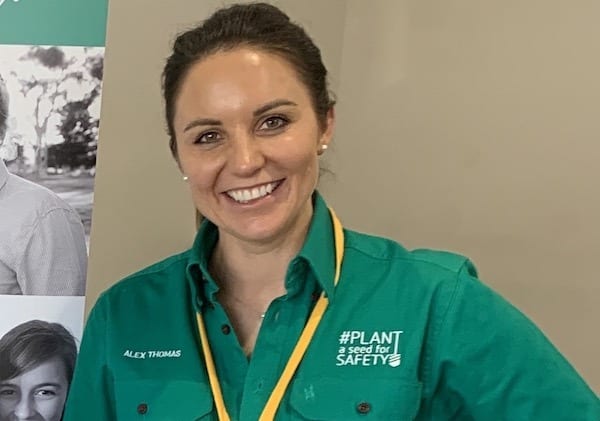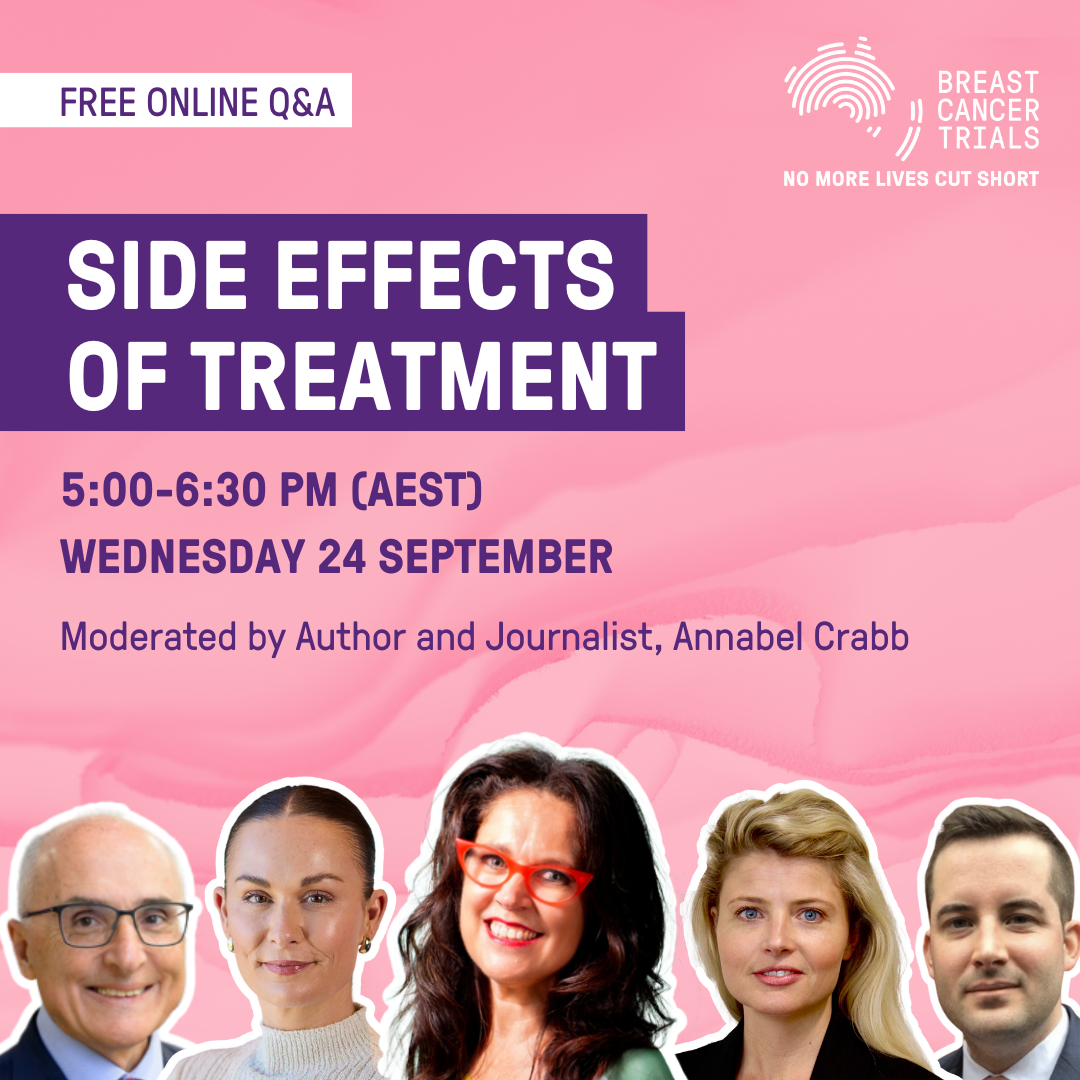And it hasn’t been easy.
But she’s pressed on regardless, creating a consultancy dedicated to helping people in rural industries re-calibrate the value proposition of work health and safety from ‘box-ticking’ to reducing the likelihood of someone getting hurt, and empowering people for change.
She also founded the #PlantASeedForSafety project globally to inspire rural men, women and children everywhere to make safer, healthier choices.
This is our latest Q&A for The Ag Wrap! Our weekly wrap for women working in agriculture. Sign up here.
Tell me about your business – what do you provide to people in agriculture?
I am the Director and Principal Consultant of my own work health and safety consulting company, Alex Thomas Pty Ltd. Contrary to some others in the health and safety profession, my work is all about helping people in rural industries re-calibrate the value proposition of work health and safety from ‘box-ticking’ to reducing the likelihood of someone getting hurt, and empowering people for change. I combine my understanding of psychology, sociology and work health and safety to facilitate safer, healthier outcomes for people, minus the bureaucratic nightmare. This includes workshops, and developing risk-based strategic safety plans, amongst other things.
What is your background?
I’m a born and bred pastoralist’s daughter who grew up on a sheep station in South Australia’s north-east pastoral. I was a School of The Air kid, am an unashamed tomboy and a lover of all-things-agriculture. I went to boarding school in Adelaide from the age of 12 (and hated it) and following the devastating sale of the station in 2003, have since lived in three different states, seven different towns and 17 different houses across Australia. While there was an enormous sense of displacement upon having to leave the station, I am now happily perched in the Adelaide Hills and am incredibly grateful for the opportunity to resume my connection with rural industries.]
What drove you to start this business?
As a young person, I was an aspiring pastoralist – however drought, absurd interest rates and abysmal wool prices had a profound impact not only on my envisaged career, but on my father’s health and our livelihood. The collective impact of drought, divorce, the sale of the station, Q fever (as a result of his work with feral goats), Ross River, diabetes, heart failure and kidney failure has meant that I’ve been caring for Dad in varying capacities since I was around 15. As an eternal empath, I’m incredibly passionate about doing as much as I possibly can to prevent that from happening to someone else.
While I never made a conscious choice to become a health and safety professional, I always knew I wanted to work in agriculture.
After selling the station, Dad and I reinvented ourselves in mining and I ‘fell’ into work health and safety, given that at that time, there wasn’t much around for women in either in agriculture or mining.
The concurrent trajectory of my career in work health and safety whilst caring for Dad and watching his health deteriorate made me all the more determined to do as much as I could to give back to the industry that has given so much to me, and to establish a business to help rural industries improve health and safety outcomes for their people.
What needs to happen in order to improve health and safety in ag?
Unfortunately, the flow on effect from superseded and heavily prescriptive health and safety legislation, the adoption of complex safety management systems in heavy industry and the moulding of the safety profession around the narrative that ‘to have safety paperwork’ = ‘to be compliant’, means that rather than focussing on the practical stuff we can do to prevent people from getting hurt, we’re spending an inordinate amount of time trying to work out what paperwork we think we need to satisfy the law.
The core intent of work health and safety legislation is to avoid killing or seriously hurting someone, and contrary to popular belief, there is not one line in the current legislation that says you need to have a ‘documented safe work procedure’.
If we realign ourselves with the ‘why’, that is, to prevent people from getting hurt in the first place – we’ll start taking practical, meaningful action to reduce the risks within our businesses, and realise that we don’t need paperwork to prove the point.
There are lots and lots of different ways to skin a cat, but we need to be willing to entertain that conversation in the first place.
How has a mostly male dominated industry reacted to you working in this field?
Work health and safety in rural industries has been a contentious topic for a long time, and the underwhelming stigma that safety = paperwork certainly doesn’t help.
Enter: a short, white, 30-something female who wants to talk to the average male farmer or fisher about ‘health and safety’ – and in short, it hasn’t been easy!
My message, whilst appealing to rural audiences given its emphasis on simplicity and practicality, is very, very different to what people have been taught to date. What I’m seeking and what is needed is a total paradigm shift, and that means people need to think differently. It also means I’ve needed an enormous public platform to share my message, of which I’m been incredibly fortunate to have had the AgriFutures Rural Women’s Award, the SafeWork SA Augusta Zadow Award and more recently the RM Williams OUTBACK magazine support me.
You have had some thought-provoking social media campaigns – tell us about those
Yes!!! The #PlantASeedForSafety (and #SaveALifeListenToYourWife!) project has been designed to not only celebrate the enormous contribution that women make to rural industries, but to recognise just how incredibly effective they are when it comes to influencing safer, healthier choices at home, in their businesses and in their communities. Rural women know their partners, their workplaces and the people around them better than anybody else does (i.e. a safety consultant or the regulator), and they’re also often the closest other person in proximity to the work being done. They’re in a fabulous position to start a conversation for change, however sometimes their confidence in their ability to do so or their perceived lack of technical knowledge about work health safety can get in the way.
By profiling the stories of rural women via the #PlantASeedForSafety website, I’m hoping to empower rural women to start an online conversation that showcases the practical, meaningful improvements that rural women have influenced within their businesses. By then sharing their messages across social media (+ some light-hearted humour!), together, I believe we’ll be able to inspire other rural men and women to make safer, healthier choices – that don’t have anything to do with doing paperwork!
#PlantASeedForSafety social media channels include Facebook, Instagram, Twitter and LinkedIn.
You have joined forces with Kiwi author Harriet Bremner – tell me about how that happened.
I certainly have, and what an incredible inspiration she is!!! Our union was born through (of all things) a connection I made on Twitter… a lovely man by the name of Tony Watson, who heads up the Agricultural Leaders Health and Safety Action Group in New Zealand. He loved the idea of #PlantASeedForSafety from the get-go, and upon seeing a television segment of Harriet and her vision to improve health and safety in rural industries in NZ, he wasted no time in hooking us up. Under a week later, we were having dinner in Christchurch and dreaming of world (rural health and safety) domination!
What are you and Harriet hoping to achieve?
Our vision is to take the #PlantASeedForSafety project global and to inspire rural men, women and children everywhere to make safer, healthier choices. Initially, this will include profiling and sharing the messages of rural women from both Australia and New Zealand.
It is a tough, uncertain time in agriculture – and indeed throughout all facets of life. What is your message to people in agriculture?
One of the things I love the most about rural industries is how deeply entrenched their values of honesty, hard-work, respect and care are. My only message to those in rural industries is to focus on the care factor. Harriet and I aren’t doing what we’re doing by mistake, we’re doing it because we’ve been deeply affected by work-related tragedies that we would hate to see happen to anyone else. Look after yourselves and look after each other, #PlantASeedForSafety and #SaveALife. ListenToYourWife!
Any tips for managing adversity on a day-to-day basis?
Demonstrating care for others often comes a hell of a lot easier than it does to care for yourself, and yet we’re no good to anyone if we don’t make conscious and ongoing decisions to invest energy into doing so. (Yes, we’ve all heard this a million times before and yes, I am the pot calling the kettle black!) I’m ridiculously good at getting on a roll with whatever I’m doing and making excuses for not going for a walk, or even dedicating the time to doing activities that aren’t ‘jobs’. I need to physically put that time aside in my calendar otherwise it simply doesn’t happen. I’ve also seen a guide / therapist every two weeks for the last four years and it’s the best thing I’ve ever done for myself.


